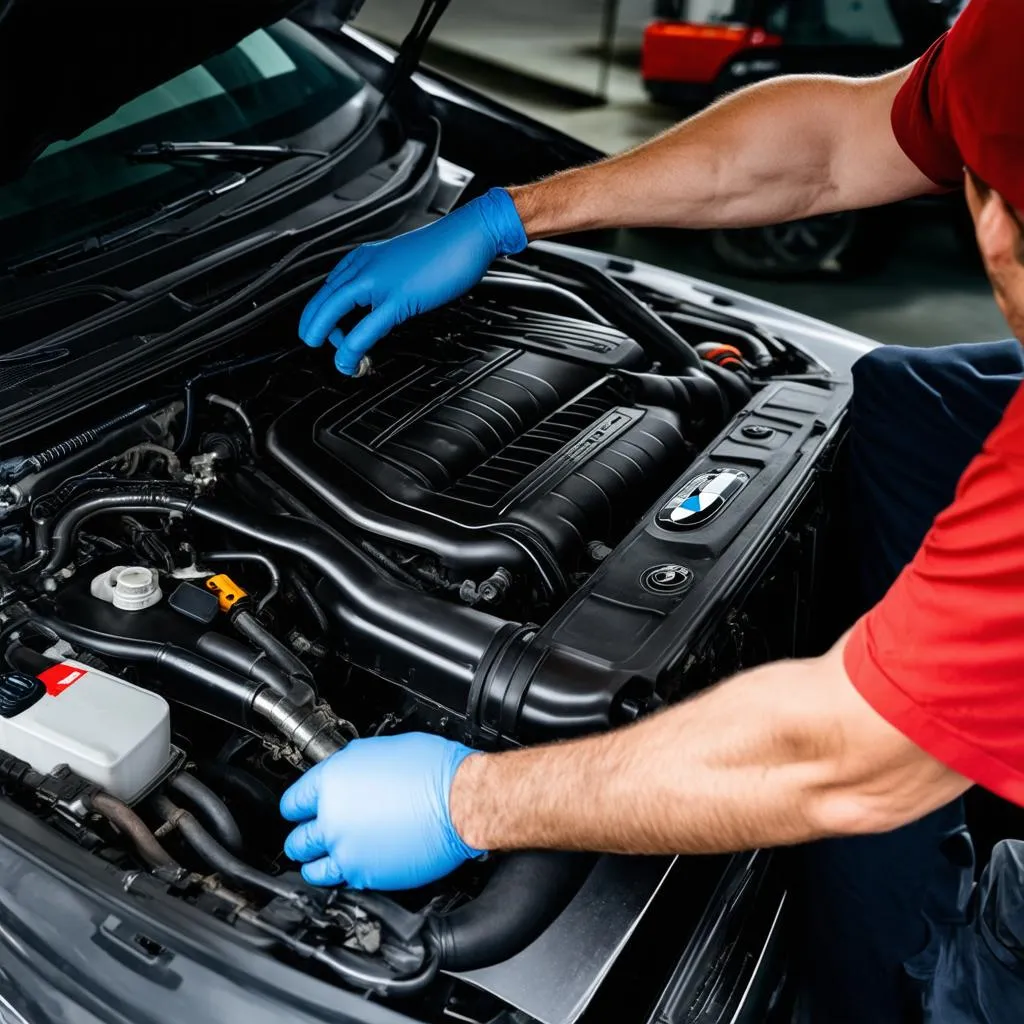The BMW N56 Engine: A Comprehensive Guide
You’re cruising down the Pacific Coast Highway in your prized 335i, the California sun warming your face, when suddenly… a check engine light. You know that sinking feeling. If you own a BMW equipped with the N56 engine, this scenario might be a little too familiar. But don’t worry, understanding this engine can help you navigate these situations with a bit more confidence.
Decoding the N56: What Makes this Engine Unique?
To the untrained eye, the N56 might just seem like another engine. However, this naturally aspirated, inline-six powerhouse represents a significant chapter in BMW’s engineering journey.
The Engineering Perspective
From a mechanic’s standpoint, the N56 is known for its technical innovations. It was one of the first BMW engines to utilize direct injection technology, aiming for increased power output and improved fuel efficiency.
“The N56’s direct injection system was a game-changer,” says Ethan Miller, a seasoned BMW mechanic based in Munich, Germany. “It allowed for a more precise fuel delivery, resulting in a noticeable performance boost.”
The Environmental Angle
The N56 engine also reflects BMW’s efforts to comply with stricter environmental regulations. It was designed to meet specific emission standards, particularly those related to nitrogen oxide emissions. This required the incorporation of advanced engine management systems and catalytic converter technology.
The Cost Factor
While renowned for its performance, the N56 engine has also been associated with some potentially costly issues, which we’ll delve into later. Understanding these potential problems can help you budget for maintenance and repairs.
Common Issues with the N56 Engine
Now, let’s address the elephant in the room – the potential issues associated with the N56. Like any complex piece of machinery, this engine is not without its quirks. Here are some commonly reported issues:
1. Valvetronic System Malfunctions
The N56 engine features BMW’s Valvetronic system, a variable valve lift technology designed to optimize performance and efficiency. However, problems with this system can lead to rough idling, reduced power, and the dreaded check engine light.
Example: Imagine driving your 128i through the bustling streets of London. You’re stuck in stop-and-go traffic, and the engine starts idling rough. This could be a sign of a Valvetronic system issue.
2. High-Pressure Fuel Pump Failures
The N56’s direct injection system relies on a high-pressure fuel pump, and unfortunately, this component has been known to fail prematurely in some cases. Symptoms of a failing fuel pump can include difficulty starting, engine misfires, and sudden loss of power.
Scenario: You’re on a road trip through the Scottish Highlands in your 528i. You’re climbing a steep incline, and suddenly, the engine loses power. This could indicate a high-pressure fuel pump failure.
3. VANOS Solenoid Problems
The VANOS (Variable Nockenwellen Steuerung) system is BMW’s variable valve timing system. Solenoids play a crucial role in regulating oil flow within the VANOS system. Malfunctioning solenoids can lead to issues like rough idling, hesitation during acceleration, and decreased fuel efficiency.
Example: Picture this: you’re driving your 328xi on the Autobahn in Germany. You attempt to accelerate quickly, but the engine hesitates. This could be a sign of VANOS solenoid problems.
Troubleshooting N56 Engine Issues: What to Do
Encountering engine problems can be frustrating, but it’s important to approach the situation methodically.
1. Diagnostic Scan: Your First Line of Defense
The first step is to get a diagnostic scan using a BMW-specific scanner, such as a Dealer Scanner for European Cars. This scan can reveal valuable fault codes that pinpoint the source of the problem.
2. Consult Reliable Resources and Forums
Online forums dedicated to BMWs can be valuable sources of information. However, always approach online advice with a degree of caution and prioritize information from reputable sources.
3. Seek Professional Help: When in Doubt, Consult an Expert
If you’re unsure about diagnosing or repairing the issue yourself, it’s always best to consult a qualified BMW mechanic. They have the expertise and specialized tools to diagnose and fix complex engine problems effectively.
FAQs: Addressing Your N56 Engine Queries
Here are some frequently asked questions about the N56 engine:
- Is the N56 engine reliable? The N56 can be reliable with proper maintenance, but it is known for certain common issues that can arise.
- What is the lifespan of an N56 engine? With proper care, an N56 engine can last well over 150,000 miles.
- What type of oil does an N56 engine require? BMW recommends using synthetic oil that meets the specifications outlined in your owner’s manual.
Beyond the N56: Exploring Other Engine Options
While the N56 engine has its place in BMW’s lineage, you might be interested in exploring other engine options offered by BMW.
 BMW Engine Lineup
BMW Engine Lineup
Your N56 Journey: Tips for a Smoother Ride
Owning a BMW with an N56 engine can be an exhilarating experience. By understanding the engine’s intricacies and potential issues, you can better equip yourself to address challenges and keep your BMW running smoothly for years to come.
 BMW N56 Maintenance
BMW N56 Maintenance
Need Help with Your BMW Diagnostics?
We understand that dealing with car trouble can be stressful. If you’re experiencing issues with your BMW and need expert assistance, don’t hesitate to reach out to us via WhatsApp at +84767531508. Our team of automotive specialists is available 24/7 to provide support and guidance.
